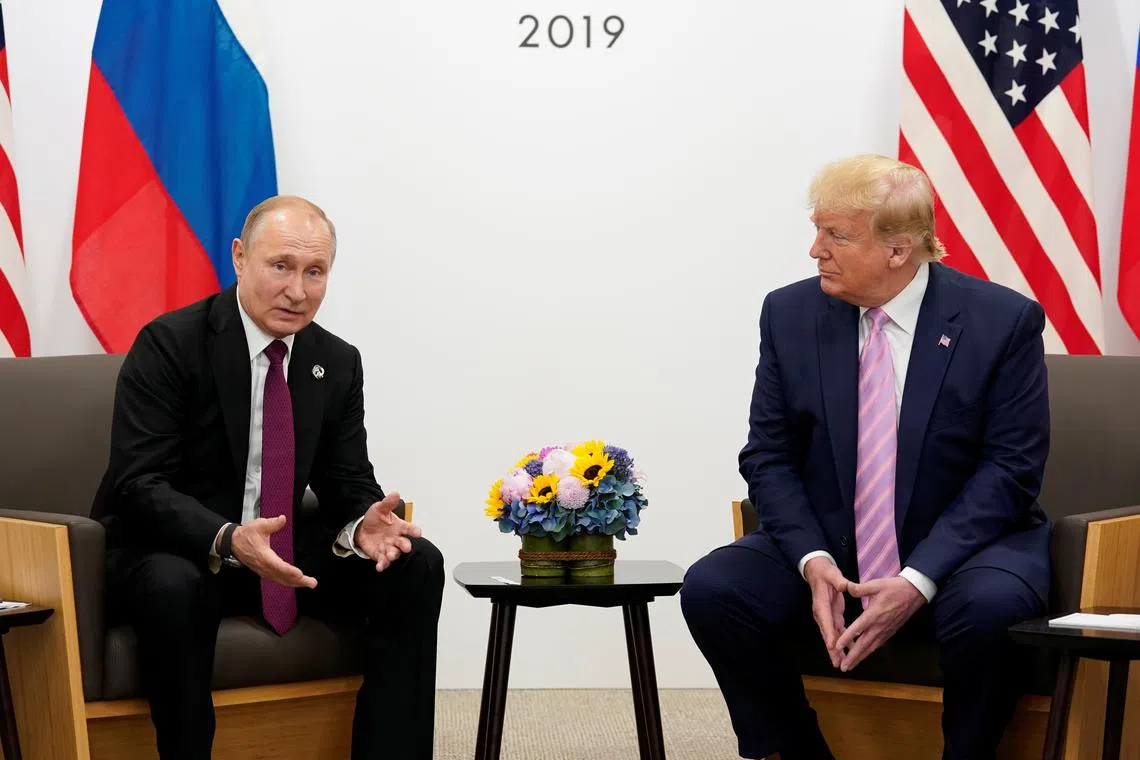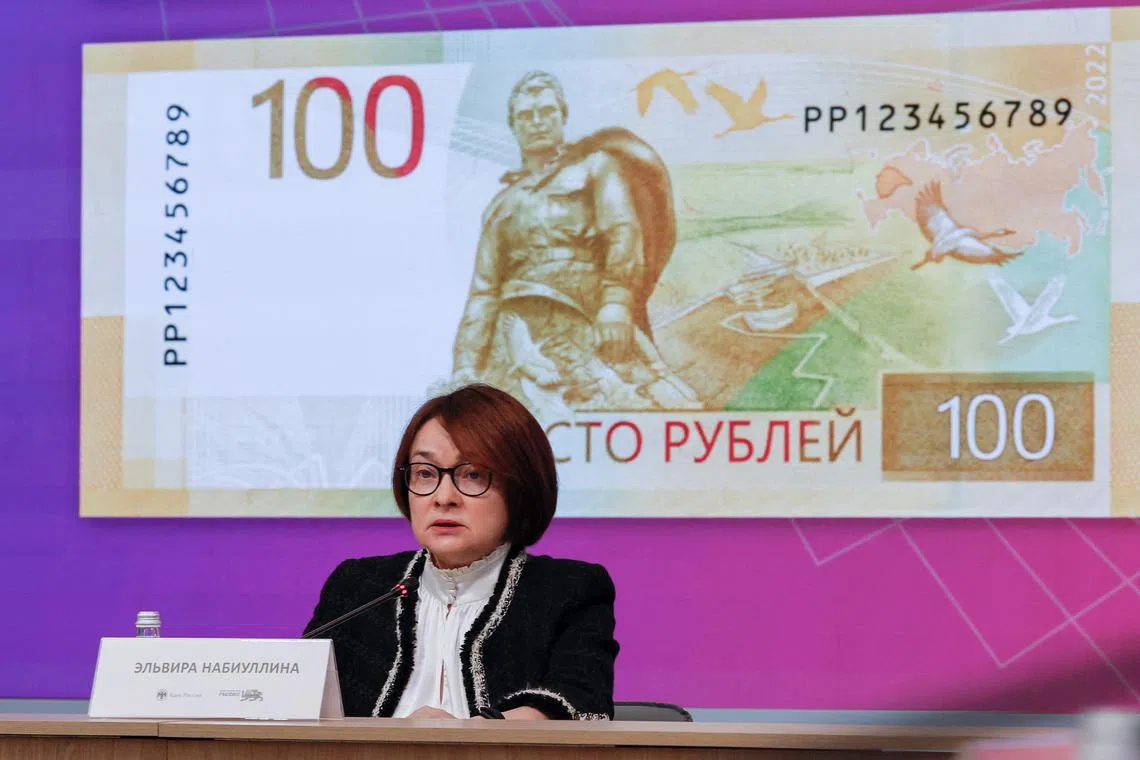Putin’s concern about Russia’s economy grows as Trump mulls over more sanctions
Sign up now: Get ST's newsletters delivered to your inbox

Russian President Vladimir Putin (left) with US President Donald Trump at a Group of 20 summit in Osaka, Japan, in 2019.
PHOTO: REUTERS
Follow topic:
MOSCOW – President Vladimir Putin has grown increasingly concerned about distortions in Russia’s wartime economy, just as US President Donald Trump pushes for an end to the Ukraine conflict, five sources with knowledge of the situation told Reuters.
Russia’s economy, driven by exports of oil, gas and minerals, grew robustly over the past two years despite multiple rounds of Western sanctions imposed after its invasion of Ukraine in 2022.
But domestic activity has become strained in recent months by labour shortages and high interest rates introduced to tackle inflation, which has accelerated under record military spending.
That has contributed to the view within a section of the Russian elite that a negotiated settlement to the war is desirable, according to two of the sources familiar with thinking in the Kremlin.
Mr Trump, who returned to office on Jan 20, has vowed to swiftly resolve the Ukraine conflict, Europe’s biggest since World War II. This week, he has said more sanctions, as well as tariffs, on Russia are likely
“Russia, of course, is economically interested in negotiating a diplomatic end to the conflict,” Dr Oleg Vyugin, former deputy chairman of the Central Bank of Russia, said in an interview, citing the risk of growing economic distortions as Russia turbocharges military and defence spending.
Dr Vyugin was not one of the five sources, who all spoke on condition of anonymity due to the sensitivity of the situation in Russia. The extent of Mr Putin’s concerns about the economy, described by the sources, and the influence of that on views within the Kremlin about the war, are documented here for the first time.
Reuters has previously reported that Mr Putin is ready to discuss ceasefire options
The Kremlin did not immediately respond to requests for comment about Mr Putin’s view on the economy and Ukraine talks.
Mr Trump “is focused on ending this brutal war” by engaging a wide range of stakeholders, White House National Security Council spokesman Brian Hughes said in response to Reuters’ questions. In recent weeks, Mr Trump’s advisers have walked back his boast that the three-year-old war could be resolved in a day.
Just days before Mr Trump’s inauguration,
Mr Putin has said that Russia can fight on as long as it takes, and that Moscow will never bow before another power over key national interests.
Russia’s US$2.2 trillion (S$3 trillion) economy had until recently shown remarkable endurance during the war, and Mr Putin has praised top economic officials and businesses for circumventing the most stringent Western sanctions ever imposed on a major economy.
After contracting in 2022, Russia’s gross domestic product (GDP) grew faster than that of the European Union and the United States in 2023 and 2024. For 2025, however, the central bank and the International Monetary Fund forecast sub-1.5 per cent growth, although the government projects a slightly rosier outlook.
Inflation has edged towards double digits despite the central bank hiking the benchmark interest rate to 21 per cent in October 2024.
“There are some issues here, namely inflation, a certain overheating of the economy,” Mr Putin said in an annual news conference on Dec 19. “The government and the central bank are already tasked with bringing the tempo down,” he said.
War goals met
In 2024, Russia made its most significant territorial gains since the early days of the war, and it now controls nearly a fifth of Ukraine.
Mr Putin believes key war goals have already been met, including control of land that connects mainland Russia to Crimea, and weakening Ukraine’s military, said one of the sources familiar with thinking in the Kremlin.
The Russian President also recognises the strain the war is putting on the economy, the source said, citing “really big problems” such as the impact of the high interest rate on non-military businesses and industry.
Russia has hiked defence spending to a post-Soviet high of 6.3 per cent of GDP in 2025, accounting for a third of budget expenditure. The spending has been inflationary. Along with wartime labour shortages, it has driven wages higher.
On top of that, the government has sought higher tax revenues to reduce the fiscal deficit.
Dr Vyugin, the former deputy governor, said sustained high rates would put pressure on the balance sheets of businesses and banks.
Russian coal and steel producer Mechel, owned by businessman Igor Zyuzin and his family, on Jan 21 said it had restructured its debt, under pressure from low coal prices and high interest rates.
Putin concern
Mr Putin’s frustration was evident at a Kremlin meeting with business leaders the evening of Dec 16, 2024, where he scolded top economic officials, according to two of the sources, who have knowledge of discussions about the economy in the Kremlin and government.
One of the sources, who was briefed after the meeting, was told Mr Putin was visibly displeased after hearing private investment was being cut because of the cost of credit.
The Kremlin released Mr Putin’s introductory comments praising business but did not identify any of the business participants at the mostly closed-door meeting. Reuters confirmed with one source that central bank governor Elvira Nabiullina was not present.
On Jan 22, Mr Putin said in televised comments to ministers that he had recently discussed with business leaders the risks of a decrease in credit activity for long-term growth, in an apparent reference to the December meeting.
Some of Russia’s most powerful businessmen, including Rosneft CEO Igor Sechin, Rostec CEO Sergei Chemezov, aluminium tycoon Oleg Deripaska and Mr Alexei Mordashov, the largest shareholder in steel-maker Severstal, have publicly criticised the high interest rates.
Ms Nabiullina has faced pressure not to raise rates further from two of Russia’s most powerful bankers – her former boss, Sberbank CEO German Gref, and VTB CEO Andrei Kostin – who feared that Russia was heading towards stagflation, one source with knowledge of discussions about the economy said.
In his Dec 19, 2024, comments, Mr Putin called for a “balanced rate decision”. The next day, at its last monetary policy meeting of the year, the central bank held the rate at 21 per cent despite market expectations of a hike by 200 basis points.
In a speech after the decision, Ms Nabiullina denied caving in to pressure. She said criticism of central bank policy increased when rates were high.
Ms Nabiullina, Mr Gref and Mr Kostin did not immediately respond to requests for comment for this story.

Russian central bank governor Elvira Nabiullina has denied caving in to pressure.
PHOTO: REUTERS
Nabiullina – one of Russia’s most powerful women
Ms Nabiullina, a former economic aide to Mr Putin who also served as his economy minister, is one of Russia’s most powerful women: She has served as central bank governor since June 2013, and three of the sources said that Mr Putin trusts her.
Just a few weeks after sending troops into Ukraine in 2022, Mr Putin proposed Ms Nabiullina take a third term as central bank chief. Her term ends in 2027.
Her supporters say critics miss the underlying cause of the inflation – the vast spending on the war – and say that without her, economic stability would have been threatened.
Some lawmakers have called for her to be replaced, an unlikely outcome, according to two of the sources.
“No one in such a situation will change the governor of the central bank,” said one of the sources, who is acquainted with discussions about the economy. “Nabiullina’s authority is indisputable, the President trusts her.” REUTERS

